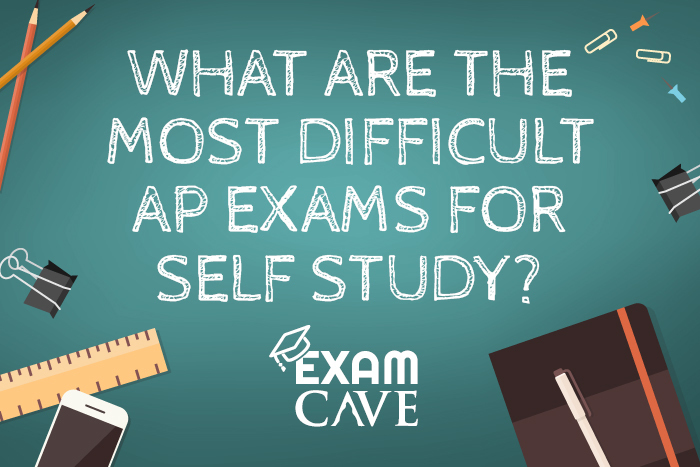AP Exam Cave
AP exams can be a real menace for students. But as long as you’ve been attentive during your AP classes, you should pass your exams with flying colors. Scoring high on your AP exams will increase your chances of being accepted to your first college of choice.
Were you thinking about taking AP courses? Read on to find out how they’re structured, and why they are essential.
What Is AP and How Does It Work?
AP stands for “advanced placement,” a program that offers college-level courses and exams to high school students. Students who score high on their AP exams may even receive college credits before graduation.
The College Board regulates all AP courses and exams. A group of college-level educators will review a class to see if it’s suitable for the AP curriculum. Once approved, the College Board lists it on the AP course ledger.
AP first began in the 1950s due to a large gap between high school and college students. The first renditions of the program started in 1952, but the official College Board Advanced Placement program didn’t launch until 1956. Now, over 22,000 offer AP exams throughout the United States.
List of Exams Offered
The list of available AP exams can be overwhelming, especially if you’re unsure about which ones you should take. Here’s a complete list of the 38 AP exams offered:
Art
- Studio Art 2-D Design
- Studio Art 3-D Design
- Studio Art Drawing
- Art History
- Music Theory
Science
- Chemistry
- Biology
- Environmental Science
- Physics 1: Algebra-Based
- Physics 2: Algebra-Based
- Physics C: Electricity and Magnetism
- Physics C: Mechanics
Mathematics and Computer Science
English
History and Social Science
- Government and Politics (Comparative)
- Government and Politics (US)
- Human Geography
- US History
- World History: Modern
- European History
- Macroeconomics
- Microeconomics
- Psychology
World Languages and Cultures
- Chinese Language and Culture
- French Language and Culture
- German Language and Culture
- Italian Language and Culture
- Japanese Language and Culture
- Spanish Language and Culture
- Spanish Literature and Culture
- Latin
Capstone Diploma Program
- AP Research
- AP Seminar
When choosing an AP course, look through the list and find subjects that interest you. If you’re excelling in your regular science classes, perhaps AP science courses are a great way to challenge yourself (and possibly earn you college credit).
Also, AP classes can give you insights about what to expect in college. If you plan on majoring in computer science, AP computer science classes will provide you with the first-hand experience on college-level course material.
Besides, displaying your strengths in an AP class and scoring high on your exams will put you ahead of the competition when applying for college. You should only take AP courses in subjects that you have experience in. This way, you’ll have a better chance of passing the exam.
How Are AP Exams Structured?
Each exam has different requirements. But there is a standard timing and structuring protocol most AP exams follow:
- Exams usually last for 2-3 hours
- Each exam contains multiple-choice and free-response sections.
- The multiple-choice section only scores correct answers. Missing or wrong answers won’t reduce your score.
- The free-response part will vary depending on the course. Students often are required to write an essay style answer, solve a problem, or provide a verbal response.
Scores range from 1 to 5. You must score between 3 and 5 to receive college credit. The multiple-choice section is graded by a computer, while college-level experts and your AP teacher tally the free-response answers.
How to Stay Focused While Studying for Your AP Exams
Exam week can be nerve-wracking. The best thing for you to do is stay focused and not become overwhelmed with pressure. Here are some things you can do to help keep you focused and relaxed when preparing for your AP exams:
Create and Follow a Routine
To help maximize your study time, try to create a strict study routine. Set a fixed schedule of when to study and when to take breaks. Study breaks are crucial for efficiency, so don’t neglect them. Studying in the same location helps. Also, group studying can be useful as long as you’re minimizing distractions. Once you’ve gotten into a comfortable routine, stick to it until exam day.
Find A Comfortable Study Area
Comfort is critical for effective studying. This isn’t limited to a spacious desk and comfortable chair. Go out and find a place that stimulates your mind. Is quiet your thing? Head on down to the library. If you’re looking for more energy, local coffee shops are a great place to get your work done.
Sleep Is Your Best Friend
You’ve probably heard about the importance of sleep a million times throughout the school year. But when it comes to preparing for your exams, sleep is vital. Lack of sleep is detrimental to your physical and mental health. Also, it inhibits your learning ability. Keeping yourself rested will ensure your brain is functioning correctly, which is crucial for retaining information.
Get Moving!
Fitness is a powerful tool. Working out will keep your mind and body healthy, which you need when preparing for an AP exam. It will also help alleviate stress and anxiety, which are omnipresent during exam week. You don’t need to work out for hours. Half an hour of physical activity a day should do the trick.
FAQ About AP Courses and Exams
Here are some of the most common questions about AP exams:
Who Should Take AP Courses?
Any student who wishes to challenge themselves with college-level course material should consider taking AP classes. It’s an excellent program for students who have already mastered the regular high school curriculum and want to get an early start on college courses.
Do Colleges Care if You Fail Your AP Exams?
In short, failing your AP exams means you will not receive college credits. Putting a failed AP exam on your GPA could negatively impact your college applications. However, it’s not the only factor that will determine whether or not you’re accepted.
What Happens If You Get A Perfect Score On Your AP Exams?
A perfect score means each question you answered on the multiple-choice section was correct and received the maximum amount of points on your free-response answers.
Do You Still Have to Pay if You Fail the AP Exam?
Yes. Even if you fail your AP exam, you are still required to pay the $94 exam fee.
When Can Students and Teachers discuss the Exam Content?
Only after every student has finished their exams, typically, students and teachers are told to wait an additional 50 minutes after testing to discuss exam content. At no time can exam content be posted online.
Am I Still Charged if I Decide Not to Take the Exam?
The school won’t charge students who don’t take the exam. If you cancel your exam after making payment, you’ll need to resort to your school’s AP exam refund policy.
Ace your AP Exams
AP exams access high school students and determine whether they are ready for the college-level subject matter. Students who score 3 or higher on their AP exams are considered qualified to start learning at a college-level for a given subject.
Though AP courses are an excellent way to get ahead, they aren’t for everyone. You should only consider taking an AP course if you have experience in the subject. Are you thinking about taking AP courses? We hope you now have a better idea about what to expect for your exams.






